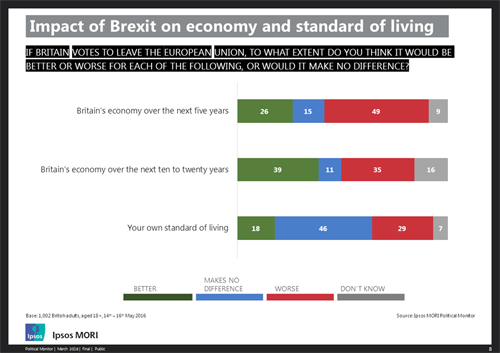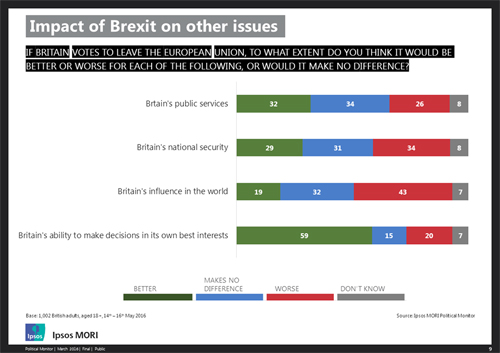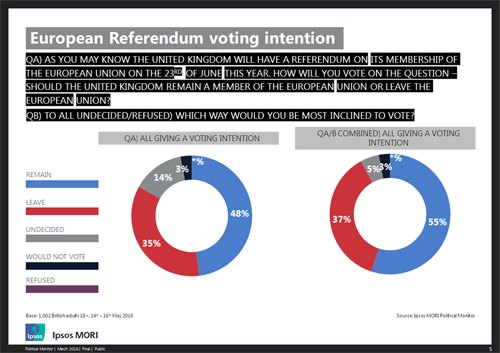Half believe the economy will get worse in the short term if Britain leaves the EU but more likely to think it will improve in the long term
With just one month to go until the referendum on Britain’s membership of the European Union, Ipsos’s new Political Monitor shows that on balance Britons believe the economy would be better off in the long term if Britain left the European Union yet likely be worse off in the years immediately following Brexit. When asked if Britain votes to leave the European Union, to what extent do you think it would be better or worse for Britain’s economy over the next five years, half (49%) say it would be worse compared with a quarter (26%) who say it would be better (15% say Brexit would make no difference). When asked about Britain’s economy over the next ten to twenty years however two in five (39%) think it would be better outside the EU compared with 35% who say it would be worse (11% say Brexit would make no difference).

The survey also asked about the impact on a number of other issues if Britain voted to leave the European Union:
- A third (32%) believe that public services would get better while a quarter (26%) believe they would get worse (34% say Brexit would make no difference)
- Three in ten (29%) say Britain’s national security would be better compared with a third (34%) who say it would be worse (31% say no difference)
- One in five (19%) say it would be better for Britain’s influence in the world compared with 43% who say it would be worse (32% say no difference)
- Three in five (59%) say it would be better for Britain’s ability to make decisions in its own best interests while one in five (20%) say it would be worse (15% say no difference)
- And 18% say it would be better for their own standard of living compared with three in ten (29%) who say it would be worse (46% say it would make no difference)

Three in ten (31%) agree with David Cameron’s position that Brexit would be worse for peace and stability in Europe compared with 5% who think it would be better and 58% who say it would make no difference.
Despite all the focus on the referendum only a quarter (26%) believes that the EU is one of the institutions that has the most impact on people's everyday lives. This compares with three in five (62%) choosing local councils, 55% saying the Government, 29% saying parliament and 20% saying the civil service.
The Political Monitor also finds an increase in those saying they will vote to remain in next month’s referendum on EU membership. Fifty-five percent say they will vote to remain while 37% say they will vote to leave (8% are still undecided).

The largest shift in these results comes from the number of Conservatives who have gone from being marginally in favour of leaving the EU in last month’s poll to clearly being in favour of remain this month (60% say they would vote remain). With more than a month to go until the referendum it will be important to see if this Conservative support of remain lasts, especially as they are also the group most likely to say they may change their minds (36%). While we are still testing turnout models, leave supporters say they are more certain to vote (our standard turnout filter gives results of 56% remain, 40% leave) and are more likely to have definitely decided.
The economy remains the top issue on voters’ minds when it comes to how they will vote in the referendum mentioned by 33% while immigration is a close second (28%). Both these issues vary in importance however when comparing by how people will vote. The economy is mentioned by 40% of those saying they will vote remain compared with 25% of those voting leave while immigration is chosen by 15% those voting remain yet half (49%) of those voting leave.
Our ongoing vote intention figures show the Conservatives still holding a slight lead over Labour. The Conservatives currently stand at 36% compared to Labour with 34%, the Liberal Democrats at 8% and UKIP at 10%.
Gideon Skinner, Head of Political Research at Ipsos, said:
“Remain has been boosted by a Conservative swing, but they are also more likely to change their mind, so in this volatile election, with voters divided over the short and long-term impacts of their decision, nothing can be taken for granted.”Technical note:
Ipsos interviewed a representative sample of 1,002 adults aged 18+ across Great Britain. Interviews were conducted by telephone 14th – 16th May 2016. This month we have also updated our weighting profile to the latest ONS and LFS population estimates. We have tested this weighting and have found the new weights make minimal difference to the overall results
.


